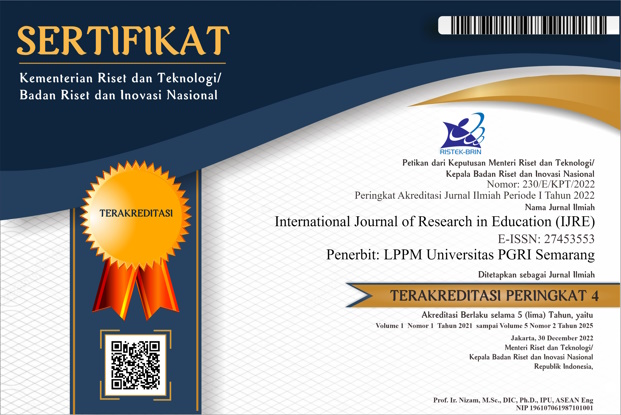The Development of Digital Teaching Materials for Basic Excellent Service Based on Google Site for Culinary Vocational Students
DOI:
https://doi.org/10.26877/ijre.v4i2.650Keywords:
Development, Digital Teaching Materials, Basic Excellent ServiceAbstract
The purpose of this study is to find out: 1) the results of the development of basic digital teaching materials for excellent service based on Google site platform; 2) the feasibility of materials and media on the basic digital teaching materials of excellent service based on the google site; 3) Student / User Response of Basic Digital Teaching Materials Excellent Service Based on the Google site. This research used research and development (R&D), especially the 4D model according to Thiagarajan. The steps in this model include defining, designing, developing, and disseminating. The data collection technique was carried out using questionnaires with research subjects, consisting of 6 validators (material & media) and 33 culinary students of SMKN8 Surabaya. Data analysis techniques using quantitative descriptive techniques Research shows: 1) digital teaching materials in can be accessed using https://bit.ly/DasarPelayananPrima links; 2) the feasibility of the material and media was declared very feasible with average scores of 92% and 87% respectively: 3) Student response was excellent with an average of 84%. Based on these results, it can be concluded that basic digital teaching materials for excellent service based on Google sites for culinary vocational students are very feasible to apply in culinary basics learning.
References
Daryanto. (2013). Menyusun Modul (Bahan Ajar untuk Persiapan Guru dalam Mengajar). Gava Media.
Dermawan, & Fahmi, R. (2020). Pengembangan E-Modul Berbasis Web Pada Mata Pelajaran Pembuatan Busana Industri. Jurnal Pedagogi Dan Pembelajaran, 3(3), 508–515. https://doi.org/10.23887/jp2.v3i3.29123
Dewi, D. K., Tri Pangesthi, L., Handajani, S., & Fatkhur Romadhoni, I. (2023). Pengembangan E-Modul Berbasis Flip PDF Corporate Edition Pada Kompetensi Dasar Puff Pastry Siswa Kelas XII SMK. Journal of Creative Student Research (JCSR), 1(2), 279–292. https://doi.org/10.55606/jcsrpolitama.v1i2.1503
Kosasih. (2021). Pengembangan Bahan Ajar. Sinar Grafika Offset.
Mahendri, R. P., Amanda, M., & Latifah, U. (2022). Pengembangan E-Modul Interaktif Berbasis Flipbook sebagai Media Pembelajaran Distance Learning. J-HyTEL: Journal of Hypermedia & Technology-Enhanced Learning, 1(1), 1–14. https://doi.org/10.58536/j-hytel.v1i1.18
Mahmudin, Ratnawati, D., & Khaharsyah, A. (2022). Pengembangan E-Modul Sistem Pendingin Berbasis. 7(April), 29–34. https://doi.org/10.21831/dinamika.v7i1.48726
Maulidiyah, S. R., Pangesthi, L. T., Bahar, A., & Purwidiani, N. (2023). Pengembangan E-Modul Berbasis Glideapps Pada Materi Hidangan Penutup Di Smk Dharma Wanita Gresik. Jurnal Riset Sosial Humaniora Dan Ilmu Pendidikan, 2(3), 47–59. https://doi.org/10.58192/sidu.v2i3.1106
Nguyen, L. T., Kanjug, I., Lowatcharin, G., Manakul, T., Poonpon, K., Sarakorn, W., Somabut, A., Srisawasdi, N., Traiyarach, S., & Tuamsuk, K. (2023). Digital Learning Ecosystem for Classroom Teaching in Thailand High Schools. SAGE Open, 13(1), 1–14. https://doi.org/10.1177/21582440231158303
Oktavia, A. S., Djumingin, S., & Munirah. (2021). Pengembangan E-Modul Bahasa Indonesia Berbasis Web di SMK Negeri 2 Wajo. Jurnal Universitas Negeri Makasar, 1(1), 1–14. https://eprints.unm.ac.id/id/eprint/19603
Shabudin, M., Aisyah, A., Darus, S., & Mimiko, N. (2014). Development of Teaching Materials and Utilization of Web 2.0 in Japanese Language Teaching and Learning. Procedia - Social and Behavioral Sciences, 118, 433–441. https://doi.org/10.1016/j.sbspro.2014.02.059
Sudikan, S. Y., Indari, T., & Faizin. (2023). Metode Penelitian dan Pengembangan (Research & Development) Dalam Pendidikan dan Pembelajaran.
Sugiyono. (2017). Metode Penelitian Kuantitatif, Kualitatif dan R&D. Alfabeta.
Suyanto, A. H. (2009). Step by Step Web Design Theory and Practices. CV. Andi Offset.
Syafei, I. (2019). Pengembangan Bahan Ajar Pendidikan Agama Islam Berbasis Problem Based Learning Untuk Menangkal Radikalisme Pada Peserta Didik Sma Negeri Di Kota Bandar Lampung. Al-Tadzkiyyah: Jurnal Pendidikan Islam, 10(1), 137–158. https://doi.org/10.24042/atjpi.v10i1.3631
Thiagarajan, Semmel, D. S., & Semmel, M. I. (1974). Instructional Development for Training Teachers of Exceptional Children : A Sourcebook Leadership Training Institute/ Special Education. University of Minnesota.
Tietz, S., Bodenbeck, L., Riedel, F., Wallwiener, M., Hennigs, A., & Heublein, S. (2022). How to make students satisfied with digital teaching? Investigative results from teaching evaluations in Gynecology and Obstetrics. Archives of Gynecology and Obstetrics, 306(5), 1587–1596. https://doi.org/10.1007/s00404-022-06645-7
Valenzuela-Pascual, F., Pàmies-Fabra, J., García-Martínez, E., Martínez-Navarro, O., Climent-Sanz, C., Gea-Sánchez, M., Virgili-Gomà, J., Rubí-Carnacea, F., Garcia-Escudero, M., & Blanco-Blanco, J. (2022). Use of a gamified website to increase pain neurophysiology knowledge and improve satisfaction and motivation among students studying for a degree in physiotherapy: a quasi-experimental study. BMC Medical Education, 22(1), 1–9. https://doi.org/10.1186/s12909-022-03457-w
Yoost, J., Ruley, M., & Durfee, L. (2021). Acceptability of a Comprehensive Sex Education Self-Study Website for Teaching Reproductive Health: A Pilot Study Among College Students and Obstetrics and Gynecology Resident Physicians. Sexual Medicine, 9(1), 100302. https://doi.org/10.1016/j.esxm.2020.100302
Youhasan, P., Henning, M. A., Chen, Y., & Lyndon, M. P. (2022). Developing and evaluating an educational web-based tool for health professions education: the Flipped Classroom Navigator. BMC Medical Education, 22(1), 1–9. https://doi.org/10.1186/s12909-022-03647-6
Zhang, N., Tan, L., Li, F., Han, B., & Xu, Y. (2021). Development and application of digital assistive teaching system for anatomy. Virtual Reality and Intelligent Hardware, 3(4), 315–335. https://doi.org/10.1016/j.vrih.2021.08.005



